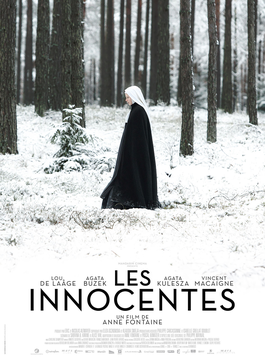At the end
of the Second World War, a young French doctor, Mathilde (Lou de
Laâge) finds a Covent home to a group of nuns some of whom are in
different stages of pregnancy. Because of these women’s faith, the
discovery is forced to be kept a secret which hinders Mathilde’s
ability to do her job as she can’t seek assistance from fellow
doctors, leaving her with a difficult job in very testing circumstances.
Anne
Fontaine’s film, Les Innocentes (English title: The
Innocents) tells an important, harrowing story, a type of
story that’s easily forgotten among all the horror that occurred
during and up to the Second World War. The brutal story about the
terrible ordeal that these Polish nuns went through is handled with
remarkable restraint and sensitivity by director Anne Fontaine who
spares us from having to go through the nightmare of the Soviet
troops raping the nuns. However, the film doesn’t lose any of its
power by leaving these scenes out and even though we never see these
horrific scenes, the event in question does not get pushed to the
background as this traumatic event is still at a very forefront of
the picture. The film examines the effect of rape during the war
periods and how epidemic it was as many suffered at the hands the
Soviet troops. The attack still lingers horribly in the air as
evident when footsteps of Soviet soldiers can be heard on the floor
below the nuns are overcome with fear.
Like
Of Gods and Men before it, The Innocents is a powerful
examination of faith. The nun’s faith teaches them to feel shame
for what has happened to them, and this causes many of them to
question their faith but for others this faith leads them to denial
and even refusal to seek medical attention to save their selves from
damnation for the sins they have supposedly committed. This may be frustrating to
certain viewers but the faith of these nuns is also shown to have
beautiful side, their songs of praise are haunting in their splendour
and the sisterly bonds built between the nuns in this terrible time
is overwhelmingly profound. This examination of the nun’s sisterly
bonds takes away something from the harrowing nature of the film,
giving it an element of hope.
Many
of the important characters are multi-layered, some wrestling with
their faith, some use their faith to convince themselves what they
are doing is right and others are risking everything to help those in
their dire moments. Agata Kulesza’s performance as the conflicted
Mother Superior, whose motivations are, to an extent, understandable,
is superb and Lou de Laâge as Mathilde Beaulieu is perfect as the
film’s emotional centrepiece. The cinematography, the film was shot
by Caroline Champetier who also worked on Of Gods and Men,
captures the sparse, featureless landscapes which mirrors the
bleakness of the times.
The
Innocents is an exceptional piece of cinema, raising awareness
about the horrors those behind the lines suffered and raising
awareness of those whose stories are often forgotten in a time of war. With death and destruction being found in many European cities, towns
and villages it is easy for events, even of this horrific nature, to go unheard of.
5/5
5/5




No comments:
Post a Comment